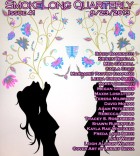I love the intangible nature of place in your story. It’s like a dream of a city, not quite real. Did you get your inspiration from the city, or did the plot come before the location?
The inspiration for the story came from a number of things. I have lived in Italy (in Milan), but I’ve only discovered Lecce recently and only as a visitor. I was definitely interested in thinking about place, but I also see the story as psychological. For me this story is about someone who is surprised there is anywhere new to discover in life—perhaps so surprised that they find it difficult to strike out and explore. In general, I was trying to think about how unknowable places are (especially to tourists) but also, more specifically, I wanted to think about a place that becomes an emblem of a character’s sense of themselves at a particular time in their life. In this case, middle age.
Your paragraphing is so good. It leaves the perfect space to see how the narrator has slipped between the cracks in her relationship. How conscious are you of elements such as the form of the piece, or does this naturally spring into shape when you start writing?
I am conscious of the form of each story in progress, but usually during re-drafts. I find I tend to use quite short paragraphs in flash stories. It’s a natural tendency, but I think it suits the pace you need in most flash pieces. I think you are absolutely right to mention space. That’s something that strikes me more and more with short stories—the importance of what you leave out. I very much enjoy the implicit in other people’s stories.
Could you tell us about the way you found the voice in this story—a woman struggling to make sense of the gap between her dreams and her reality?
I think this is an introvert’s story. It is a story about what might seem to some readers as a peculiar level of passivity. But I find that type of personality and voice fascinating. It might seem dangerous to write about such a passive character—the danger being that that sort of character might be perceived to be too inert to be interesting. But that’s the wonderful thing about the short story. It’s a form that seems particularly attuned to enquiring into those odd cul-de-sacs of the human psyche that the novel swerves past.



 The core workshop of SmokeLong Fitness is all in writing, so you can take part from anywhere at anytime. We are excited about creating a supportive, consistent and structured environment for flash writers to work on their craft in a community. We are thrilled and proud to say that our workshop participants have won, placed, or been listed in every major flash competition. Community works.
The core workshop of SmokeLong Fitness is all in writing, so you can take part from anywhere at anytime. We are excited about creating a supportive, consistent and structured environment for flash writers to work on their craft in a community. We are thrilled and proud to say that our workshop participants have won, placed, or been listed in every major flash competition. Community works.